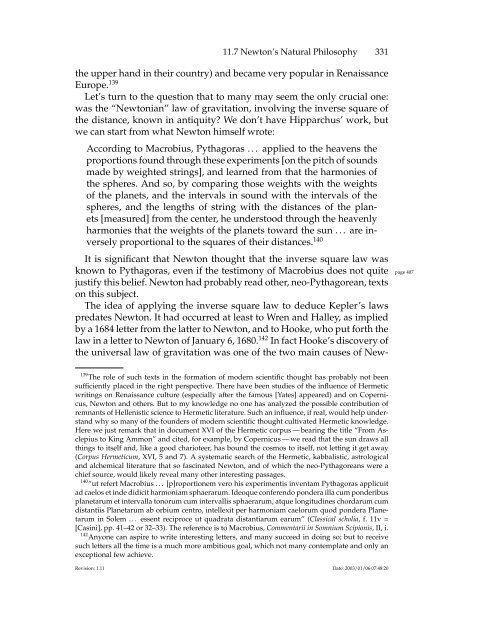1 The Birth of Science - MSRI
1 The Birth of Science - MSRI
1 The Birth of Science - MSRI
You also want an ePaper? Increase the reach of your titles
YUMPU automatically turns print PDFs into web optimized ePapers that Google loves.
11.7 Newton’s Natural Philosophy 331<br />
the upper hand in their country) and became very popular in Renaissance<br />
Europe. 139<br />
Let’s turn to the question that to many may seem the only crucial one:<br />
was the “Newtonian” law <strong>of</strong> gravitation, involving the inverse square <strong>of</strong><br />
the distance, known in antiquity? We don’t have Hipparchus’ work, but<br />
we can start from what Newton himself wrote:<br />
According to Macrobius, Pythagoras . . . applied to the heavens the<br />
proportions found through these experiments [on the pitch <strong>of</strong> sounds<br />
made by weighted strings], and learned from that the harmonies <strong>of</strong><br />
the spheres. And so, by comparing those weights with the weights<br />
<strong>of</strong> the planets, and the intervals in sound with the intervals <strong>of</strong> the<br />
spheres, and the lengths <strong>of</strong> string with the distances <strong>of</strong> the planets<br />
[measured] from the center, he understood through the heavenly<br />
harmonies that the weights <strong>of</strong> the planets toward the sun . . . are inversely<br />
proportional to the squares <strong>of</strong> their distances. 140<br />
It is significant that Newton thought that the inverse square law was<br />
known to Pythagoras, even if the testimony <strong>of</strong> Macrobius does not quite page 407<br />
justify this belief. Newton had probably read other, neo-Pythagorean, texts<br />
on this subject.<br />
<strong>The</strong> idea <strong>of</strong> applying the inverse square law to deduce Kepler’s laws<br />
predates Newton. It had occurred at least to Wren and Halley, as implied<br />
by a 1684 letter from the latter to Newton, and to Hooke, who put forth the<br />
law in a letter to Newton <strong>of</strong> January 6, 1680. 142 In fact Hooke’s discovery <strong>of</strong><br />
the universal law <strong>of</strong> gravitation was one <strong>of</strong> the two main causes <strong>of</strong> New-<br />
139 <strong>The</strong> role <strong>of</strong> such texts in the formation <strong>of</strong> modern scientific thought has probably not been<br />
sufficiently placed in the right perspective. <strong>The</strong>re have been studies <strong>of</strong> the influence <strong>of</strong> Hermetic<br />
writings on Renaissance culture (especially after the famous [Yates] appeared) and on Copernicus,<br />
Newton and others. But to my knowledge no one has analyzed the possible contribution <strong>of</strong><br />
remnants <strong>of</strong> Hellenistic science to Hermetic literature. Such an influence, if real, would help understand<br />
why so many <strong>of</strong> the founders <strong>of</strong> modern scientific thought cultivated Hermetic knowledge.<br />
Here we just remark that in document XVI <strong>of</strong> the Hermetic corpus — bearing the title “From Asclepius<br />
to King Ammon” and cited, for example, by Copernicus — we read that the sun draws all<br />
things to itself and, like a good charioteer, has bound the cosmos to itself, not letting it get away<br />
(Corpus Hermeticum, XVI, 5 and 7). A systematic search <strong>of</strong> the Hermetic, kabbalistic, astrological<br />
and alchemical literature that so fascinated Newton, and <strong>of</strong> which the neo-Pythagoreans were a<br />
chief source, would likely reveal many other interesting passages.<br />
140 “ut refert Macrobius . . . [p]roportionem vero his experimentis inventam Pythagoras applicuit<br />
ad caelos et inde didicit harmoniam sphaerarum. Ideoque conferendo pondera illa cum ponderibus<br />
planetarum et intervalla tonorum cum intervallis sphaerarum, atque longitudines chordarum cum<br />
distantiis Planetarum ab orbium centro, intellexit per harmoniam caelorum quod pondera Planetarum<br />
in Solem . . . essent reciproce ut quadrata distantiarum earum” (Classical scholia, f. 11v =<br />
[Casini], pp. 41–42 or 32–33). <strong>The</strong> reference is to Macrobius, Commentarii in Somnium Scipionis, II, i.<br />
142 Anyone can aspire to write interesting letters, and many succeed in doing so; but to receive<br />
such letters all the time is a much more ambitious goal, which not many contemplate and only an<br />
exceptional few achieve.<br />
Revision: 1.11 Date: 2003/01/06 07:48:20










